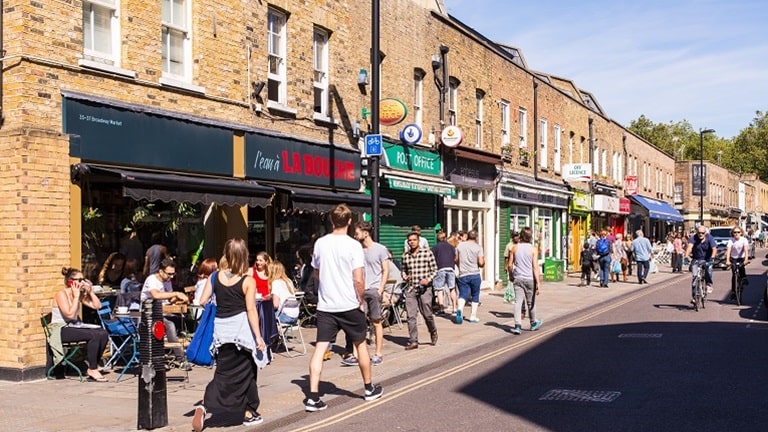Renting business premises

Grow London Local
Posted: Fri 5th Apr 2024
Renting your business premises instead of buying them outright is the preferred option for most businesses. That's because it's cheaper and more flexible, and doesn't tie you into a long-term mortgage contract that could create difficulties if you encounter any financial issues.
Best of all, there are many great commercial properties available to rent in London, so you can find a property that suits your business' needs.
That said, finding the right rental premises for your business will still take time and effort. You should only enter into a commercial property contract if you fully understand the costs and implications of it.
This guide explains everything you need to know about renting business premises, which terms and conditions your agreements should cover, as well as potential costs.
What's the difference between a lease and licence to occupy?
To rent business premises, you'll need to enter into either a lease or a 'licence to occupy' arrangement with the owner or landlord of the property.
A lease is a legal document the property owner or landlord issues that gives your business the exclusive right to occupy premises as a tenant for a fixed term.
A licence to occupy is a flexible short-term agreement that lets you occupy premises on "easy-in, easy-out" terms. It can be a good option if you aren't sure about how long you want to occupy the premises.
Key features of a licence
They are short term, with either party needing to give only a month's notice to quit.
You can use them on a temporary basis while you negotiate a full lease.
Under a licence, you don't enjoy "security of tenure", which means you don't have a legal right to stay in the property when the licence ends.
The law doesn't control rent.
You don't have an exclusive right to the property.
Exclusive rights
Exclusivity is an important distinction between leases and licences to occupy. Put simply, exclusivity means only you can use the premises. Non-exclusivity means the landlord or owner can use them too.
So, if your project needs full, exclusive use of the premises, a lease is going to be more appropriate. If you don't mind sharing all or part of the space, a licence may be your best option.
Lease agreement
A lease agreement sets out your and your landlord's rights and obligations. Here are the terms usually covered in a lease agreement:
Lease term: this may be between three and five years, but can be longer, with some as long as 25 years or more.
Notice period to terminate the agreement, including break clauses: these clauses allow you (and/or the landlord) to end the agreement early, after a specified length of time.
Value of the rent and review dates: rent may be charged monthly or quarterly in advance and may be subject to VAT. The agreement may allow your landlord to review the rent regularly.
Insurance obligations: it should be clear who is responsible for insuring the premises.
Access rights: do you have access to the premises at all times? How do you access them? Does the landlord have any rights of access? Is access provided to any shared areas in a multi-let building?
Repairs and renewals: what responsibilities do you have for maintaining and repairing the premises? If you're responsible for repairs and maintenance on an old or unique building, these costs can be high, and you should consult specialist advice before agreeing to be responsible.
Decoration and signs: you may need the landlord's permission for any signs you want to install at the premises.
Service charge: you might have to pay an extra fee for any shared services the landlord provides. Service charges usually cover the cost of shared spaces such as lifts, reception, gardens and so on.
Security measures: a lease agreement usually specifies who is responsible for the security of the premises.
Use: a lease agreement will usually say how you can use the premises.
Provision of services: the agreement should specify whether you or the landlord are responsible for installing, maintaining and paying for services and other utilities such as water and broadband.
The process of agreeing a lease
This involves three key stages:
Agreeing heads of terms: this is a summary of the agreement between both parties in the potential lease agreement. While they can look quite complex, it's unlikely to be a legally binding document. It shows that you and the landlord intend to enter into a lease.
Lease negotiations: when negotiating a lease, you should make sure that you understand all costs and responsibilities. Always seek specialist advice if you're not sure, as you may be signing up for something that isn't appropriate for your organisation.
The signing of the lease: the lease, once signed, is a legally binding document.
Obligations as a tenant
Once you sign the lease, your landlord will expect you to maintain the property to a reasonable standard. You should also take out appropriate insurance, pay business rates and abide by health and safety regulations.
At the end of the lease, you should leave the property in an acceptable state of repair. Many commercial landlords will ask that you restore the premises to their original condition when leaving.
Make sure that you can provide evidence to your landlord that you've met all your obligations. When you first move in, it's a good idea to take photos of the premises, especially if you see signs of damage.
That way, you'll have a good record of the condition it was in at the start of your tenancy, so you can't be held responsible for repairing any damage that you didn't cause.
Rights as a tenant
The purpose of renting the premises is to provide a base for your business. Unless there are any restrictions in the lease agreement that prevent you from doing so, you're entitled to use the premises in any lawful way necessary to run your business.
You also have the right to make any alterations to the property so that it's fit for purpose, as long as you don't break the terms of your lease. If you want to make big changes to how the inside looks, you'll probably need your landlord's approval. Significant structural changes may need planning permission.
Costs to expect when renting business premises
Rent and rates: you'll probably need to pay an initial deposit as security (which could be up to six months' rent), as well as ongoing rent and business rates, which are based on your property's size and rateable value.
Service charges: these could cover site management, cleaning of communal areas, security and waste collection.
Legal fees: it's a good idea to ask a solicitor to check the lease and make sure it meets your needs. Money spent on professional advice at this stage can prevent expensive legal disputes later on.
Landline telephones and broadband: this includes the cost of installation and ongoing service charges.
Insurance premiums: the landlord will probably be responsible for insuring the building itself, but you should insure the contents and equipment in your business premises.
Keeping to the law: if you're opening up the premises to the public for the first time, you must keep to relevant regulations covering accessibility and health and safety before you start trading.
This may involve costly modifications (such as building an access ramp), so it's vital to check whether these adjustments are your responsibility or the landlord's.
Internal furnishings and fittings: this includes anything you need to conduct your business (for example, mirrors, sinks and salon chairs).
Terminating a lease
It's important to check that the terms of the agreement allow you to end, sublet or reassign the lease before the lease period ends. You may never need to, but it's important to have the option as it gives you some flexibility.
The lease will say how much notice to terminate you must give the landlord. Check the wording of the termination clause carefully. You or the landlord may be able to terminate with a period of notice, but under some commercial leases this isn't possible.
Once you give notice of your plans to leave the premises, the landlord will visit and prepare the "schedule of dilapidations". This is a list of all the repairs and alterations you're responsible for. You may carry out any necessary repairs yourself, or you can allow the landlord to carry them out and charge you for the work.
Hints and tips
It's important to plan ahead and work out the timescales and costs of moving into new premises.
The landlord is likely to need a financial reference and may ask you for personal guarantees to cover the rent payments. A returnable deposit may be an alternative to providing a personal guarantee.
It's essential that you check all obligations under the lease, especially any restrictions on alterations you can make to the inside and outside of the premises.
If you're changing the use of the premises, you may need planning approval from your local authority. You should make sure any necessary planning approvals are in place before signing a lease agreement.
You should also take legal advice when reviewing the terms of the agreement. Every commercial agreement is different, so it's very important to review all leases properly.
Your cultural and community space toolkit
If you're reading this guide as part of the toolkit for opening, running and growing a cultural or community space, next look at step 6: assignment and subletting.
Take our free Business Success Check
Create a free account with Grow London Local and get personalised recommendations for how to take your business forward. You'll also get access to all the benefits of an Enterprise Nation membership. Sign up to Grow London Local now
Grow London Local
Disclaimer: The content provided on this site, whether by Grow London Local or by third parties, is by way of general guidance only. Grow London Local does not accept any liability for any loss or damage that any person incurs as a result of any content on this site. Please note that where you purchase paid services or content from third parties, your agreement is solely with those third parties.
Subscribe now
Never miss a post with the latest insights and updates.
You can view a sample here.
By subscribing you agree to our Terms of Use and Privacy Policy. You can unsubscribe at any time by using the "Unsubscribe" link at the bottom of any email we send you.
